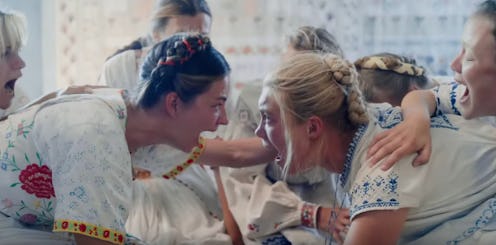Entertainment
Even 'Midsommar's Director & Lead Actor Can't Agree On What Its Ending Means
Warning: Spoilers ahead. The new horror film directed by Hereditary creator Ari Aster, Midsommar, came out on July 3, and it's left moviegoers with lingering questions besides, "WTF did I just watch?" While most of Midsommar takes place in the broad daylight of a Swedish summer, the movie about a cultish Midsummer celebration leaves viewers in the dark as to what malicious conspiracy they've stumbled into. At the end it's revealed that the outsiders were brought to the village, Hårga, so they could be sacrificed. But Midsommar's ending's meaning could have a few different interpretations, and even Aster and the film's star Florence Pugh disagree over what it is.
The final scene of Midsommar shows Pugh's character Dani, the only non-Hårga villager to survive the ritualistic killings, watching as her ex-boyfriend Christian (Jack Reynor), and his friends Josh (William Jackson Harper) and Mark (Will Poulter) burn in a building as human sacrifices. Dani, adorned with a face-framing flower crown from becoming the "May Queen," first appears saddened over the brutal murders. Eventually Dani looks off into the flames and smiles, though, so what does that mean? According to Aster in an interview with USA Today, it's that Dani feels sadistically pleased with Christian's punishment after he treated her so terribly throughout the film.
Aster called the ending "A sort of perverse, wish-fulfillment fantasy." He continued, "The film offers catharsis at the end that hopefully people can get into, but will also have to wrestle with later."
As much as Christian's gas-lighting, emotional avoidance, and eventual cheating in Midsommar paints him as a terrible boyfriend to Dani, it's likely difficult for many viewers to believe that Dani truly felt happy when watching him burn alive. Who would? Mourning the shocking loss of her family throughout the film and taking multiple doses of hallucinogenic drugs while on the Sweden trip likely influenced Dani's reaction — at least that's what Pugh believes. In the aforementioned USA Today article, the actor said, "She doesn't realize what's going on, and she's just really happy the fire is going up."
Even though Dani chooses for Christian to die over one of the Hårga locals, Pugh said that she didn't approach the ending as something that her character would necessarily want to see happen if she hadn't lost her mind. "I don't think I would've supported Dani as much if she knew that he was in there. I don't think anybody is that sinister," Pugh said. She continued, "I know Christian was a bit of a (expletive), but I didn't want her to be evil at the end."
Then, Aster responded, "I wouldn't agree with there ever being an iteration of the movie where she didn't know he was burning. But there were a lot of scenes that were cut, and probably a few that helped illustrate she was losing her grip on her sanity, which you hopefully still see."
It makes sense that after Pugh connected with her character, her interpretation of Midsommar's ending doesn't portray Dani as an evil murderer. Pugh had to connect with Dani emotionally, after all. In an interview with Refinery29, the British actor said, "It was so sad and depressing and emotional to play her, and I knew I couldn't just wing it and figure out how she felt, because it is so important to the storyline that she is struggling."
Perhaps Pugh had greater insight into Dani's motives and understandings than Midsommar's creator, who has repeatedly spoken about the movie being a breakup movie, inspired by the collapse of his own relationship. There's still room for additional interpretations of Midsommar's ending, though, so don't count yours out just because it's different from the film's director and star.
